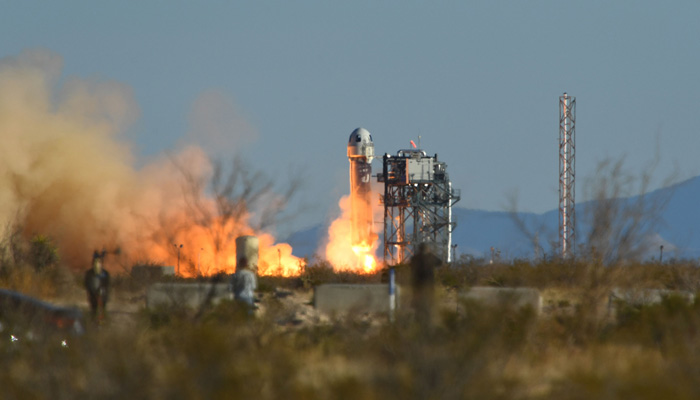Did Jeff Bezos cover up Blue Origin rocket explosion after Nasa contract?
Reports suggest that the accidental explosion occurred at Blue Origin's testing facility in West Texas on June 30
July 14, 2023

Amazon founder Jeff Bezos' aerospace company Blue Origin blew up its rocket last month without disclosing the incident, according to a CNBC report, nearly a month after Nasa awarded the billionaire’s firm to develop spacecraft for the moon landing.
According to the report, which cited anonymous sources noted that the accidental explosion occurred at Blue Origin's testing facility in West Texas on 30 June.
Later, the incident was confirmed by the 59-year-old entrepreneur's company stating that its team "ran into an issue while testing Vulcan's Flight Engine 3."
A spokesperson said: "No personnel were injured and we are currently assessing root cause... We already have proximate cause and are working on remedial actions."
The explosion comes days after the US space agency announced to hire Blue Origin in May as the second company after Elon Musk's SpaceX to develop a spacecraft allowing astronauts to land on the moon.
Under Nasa’s Artemis moon programme, the agency awarded Musk's aerospace firm $3 billion worth of a contract in 2021 to allow astronauts to set foot on the moon again after Apollo’s 1972 mission.
The Blue Origin contract is valued at roughly $3.4 billion, Nasa's exploration chief Jim Free said.
Meanwhile, Blue Origin's Vice President John Couluris said that the company will contribute "well north" of that amount.
"We’re making an additional investment in the infrastructure that will pave the way to land the first humans on Mars," Nasa Administrator Bill Nelson said in announcing the Blue Origin award.
"Our shared ambitions now are no less lofty than when President [John F.] Kennedy dared a generation of dreamers to journey to the moon," he added.
Taking to Twitter, Bezos said that he was "honoured to be on this journey with Nasa to land astronauts on the Moon — this time to stay."
Blue Origin recently concluded its first flight-ready BE-4 engines, despite being initially planned for 2017, with June's explosion occurring during something known as an "acceptance test" (ATP).
ULA president Tory Bruno said Tuesday that ATP failures were “not uncommon, and a routine part of rocket development.”
“We analyse each for potential crossover, as a discipline,” he tweeted.
“Many other BE-4s have passed ATP and one on to hot fire. This one had failed an earlier ATP attempt and was reworked.”









